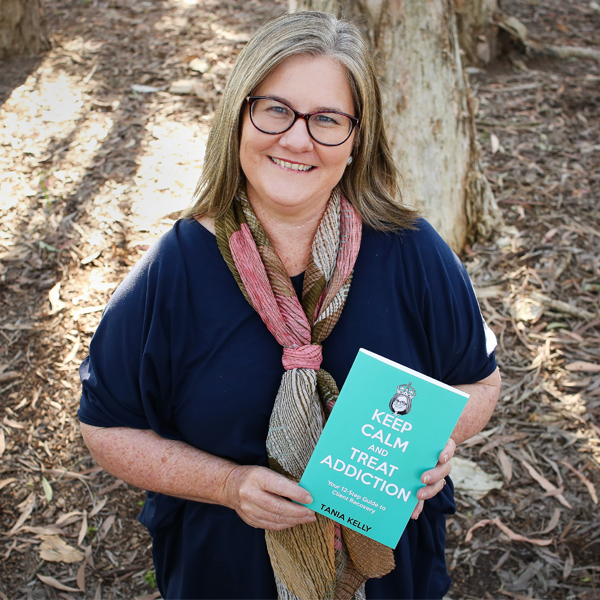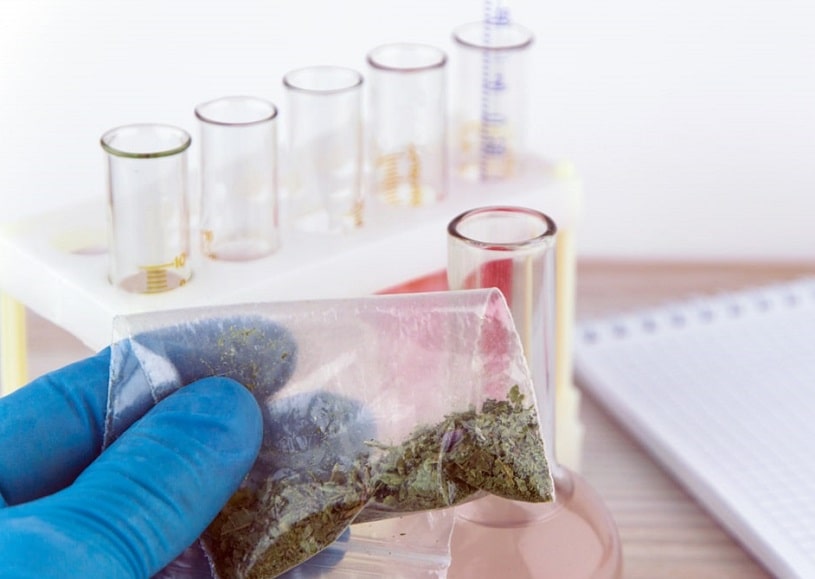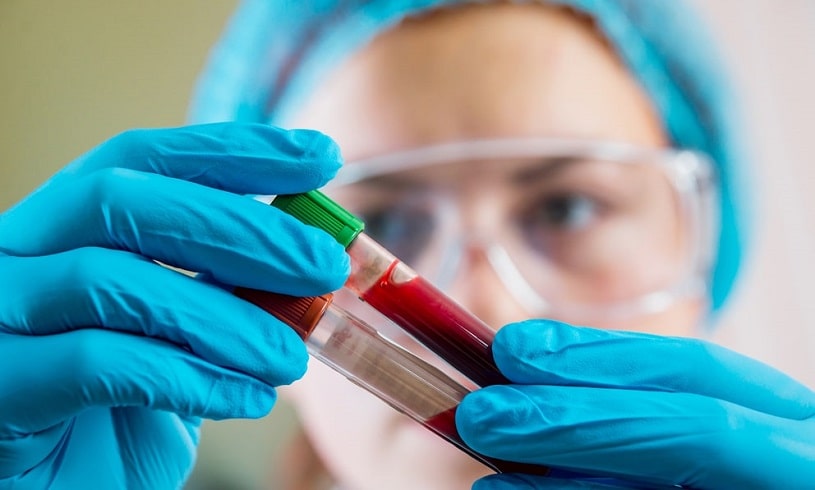Spice or K2 are the names for a chemically diverse group of synthetic cannabinoids or cannabimimetic. Despite claims of being a “natural” high, these drugs are metabolized to several other synthetic compounds within our bodies. Here we’ll take a look at how long these compounds can remain detectable in various body fluids, how they are metabolized, and factors that affect their elimination.
Table Of Contents:
Does K2 Show Up On a Drug Test?
Unfortunately, K2 or synthetic marijuana cannot be detected by routine urine toxicology tests and standard marijuana detection kits. Therefore performing a spice drug test requires special detection methods. One significant issue health practitioners and law enforcement face when testing for synthetic cannabinoids is the rapid rate of creation of newer compounds.
This makes old testing kits quickly outdated and makes it more likely for new drugs to slip silently under the radar before being discovered. Newer K2 drug test kits must therefore test for multiple compounds, both old and new. This increases their chances of detecting any illegal substances in the given sample.
Here Are a Few Common Compounds that Are Detected By the K2 Drug Test Kit:
- JWH-018 (pentanoic acid)
- JWH-073 (butanoic acid)
What Factors Can Affect Spice Elimination?
Spice is practically never excreted in its original form. It is metabolized within body cells and removed through various waste products like urine and sweat. The amount of time K2/Spice remains within the body may differ significantly depending on several factors. These Factors Include:
- How long the user has been smoking the product. Synthetic marijuana metabolites remain detectable longer in those who chronically abuse the drug.
- How much of the drug was consumed. The half-life of a drug is how long it takes for half of the original dose to be broken down. Higher doses of Spice take longer to be eliminated.
- One’s overall health. Certain disease conditions, especially those affecting your liver and kidney, compromise your ability to eliminate metabolites and harmful toxins effectively.
- Route of administration. The time taken to eliminate a substance depends on the route of administration. In this situation, whether the product was smoked or ingested.
- The purity of the product. Mixing synthetic cannabinoids with other substances may alter the way the body metabolizes the product. This may, in turn, affect its elimination.
How Is Synthetic Marijuana Metabolized In A Body?
Synthetic cannabinoids are metabolized by different pathways than natural cannabinoids. They undergo extensive glucuronidation within the liver to give high concentrations of glucuronic acid-conjugated metabolites within the urine.
They also undergo metabolism via hydroxylation, particularly within the lungs. The cytochrome oxidase pathways are particularly important in the hydroxylation of Spice metabolites within the body.
What Is Spice Half-Life?
One major hurdle faced by researchers when they attempt to determine the half-life of Spice is that the drug is made up of several compounds. Every year new synthetic cannabinoids are created, each with their unique chemical properties, adverse effects and risks.
Therefore the half-lives most commonly quoted are those of the most studied elements of synthetic marijuana. Some of the most popularly studied forms include JWH-073, which has a half-life of 74.2 minutes, and JWH-018, which has a half-life of around 23 minutes. This means both drugs are quickly eliminated from the body.
Another important feature of synthetic cannabinoids is that they rarely exist in their original state within our cells. This is due to their rapid metabolism within our bodies. Even the metabolites formed are quickly broken down, giving a concise window to administer a Spice drug test.
Therefore researchers are especially interested in how long these substances remain at detectable levels within our bodies. This has led to the discovery of the respective half-lives within different body tissues.
How Long Does Spice Stay In Your Blood?
Generally, detectable levels of synthetic cannabinoids can be demonstrated in the blood for only 24-48 hours after ingestion. This poses a significant challenge in the detection and diagnosis of synthetic cannabinoid poisoning. Therefore blood tests for Spice are generally used to determine if the individual is actively under the influence of the drug.
How Long Does Spice Stay In Your Urine?
Newer Spice drug test kits are now able to detect a wider range of metabolites. Current test kits can detect the characteristic metabolites produced up to 72 hours after consumption. This allows for testing for abuse. Current urine test kits mainly test for two popular synthetic marijuana formulations, JWH-018 and JWH-073.
How Long Does Spice Stay In Your Hair?
The exact duration of time that K2 can remain detectable in hair samples is uncertain. Still, most studies suggest that the metabolites’ detectable levels can be seen as long as 90 days after consumption. This may be helpful for long-term addiction testing. Hair samples are, however, not routinely tested as they require more specialized testing techniques.
How Long Does Spice Stay In Your Saliva?
Saliva samples are another popular method of testing for synthetic cannabinoid use. Spice generally can be detected in the saliva for up to 48 hours after consumption. However, these figures can vary widely, with some putting the value from an hour to just under 12 hours depending on the particular compound being tested for. Therefore it is reliable only for testing for acute abuse.
K2 Addiction Treatment
Acute abuse of K2 can lead to synthetic cannabinoid poisoning, which is a serious medical situation. Chronic abuse of synthetic marijuana can easily lead to addiction. This may require one to seek treatment in the form of assisted rehab.
There are several rehab options for those struggling with synthetic marijuana addiction and concomitant addiction to other drugs. Reaching out to a rehab center is the first step on the road to recovery.
Page Sources
- Synthetic Cannabinoids: Epidemiology, Pharmacodynamics, and Clinical Implications. Marisol S. Castaneto, David A. Gorelick, [...], and Marilyn A. Huestis. August 2014. https://www.ncbi.nlm.nih.gov/pmc/articles/PMC4253059/
- Distinct pharmacology and metabolism of K2 synthetic cannabinoids compared to Δ9-THC: Mechanism underlying greater toxicity? William E. Fantegrossi, Jeffery H. Moran, [...], and Paul L. Prather. September 2013. https://www.ncbi.nlm.nih.gov/pmc/articles/PMC3945037/
- Current knowledge on cannabinoids in oral fluid. Dayong Lee et al. Drug Test Anal. Jan-Feb 2014. https://pubmed.ncbi.nlm.nih.gov/23983217/
- Synthetic cannabinoids 2015: An update for pediatricians in clinical practice. Daniel Castellanos and Leonard M Gralnik. https://www.ncbi.nlm.nih.gov/pmc/articles/PMC4737689/
- Pharmacokinetic properties of the synthetic cannabinoid JWH-018 in oral fluid after inhalation. Stefan W Toennes et al. Drug Test Anal. 2018 Apr. https://pubmed.ncbi.nlm.nih.gov/28967189/
- JWH-073. Critical Review Report. Expert Committee on Drug Dependence, Thirty-eight Meeting. Geneva, 14-18 November 2016. https://www.who.int/medicines/access./controlled-substances/4.11_JWH-073_CritReview.pdf

 Authored by
Authored by  Reviewed by
Reviewed by 


